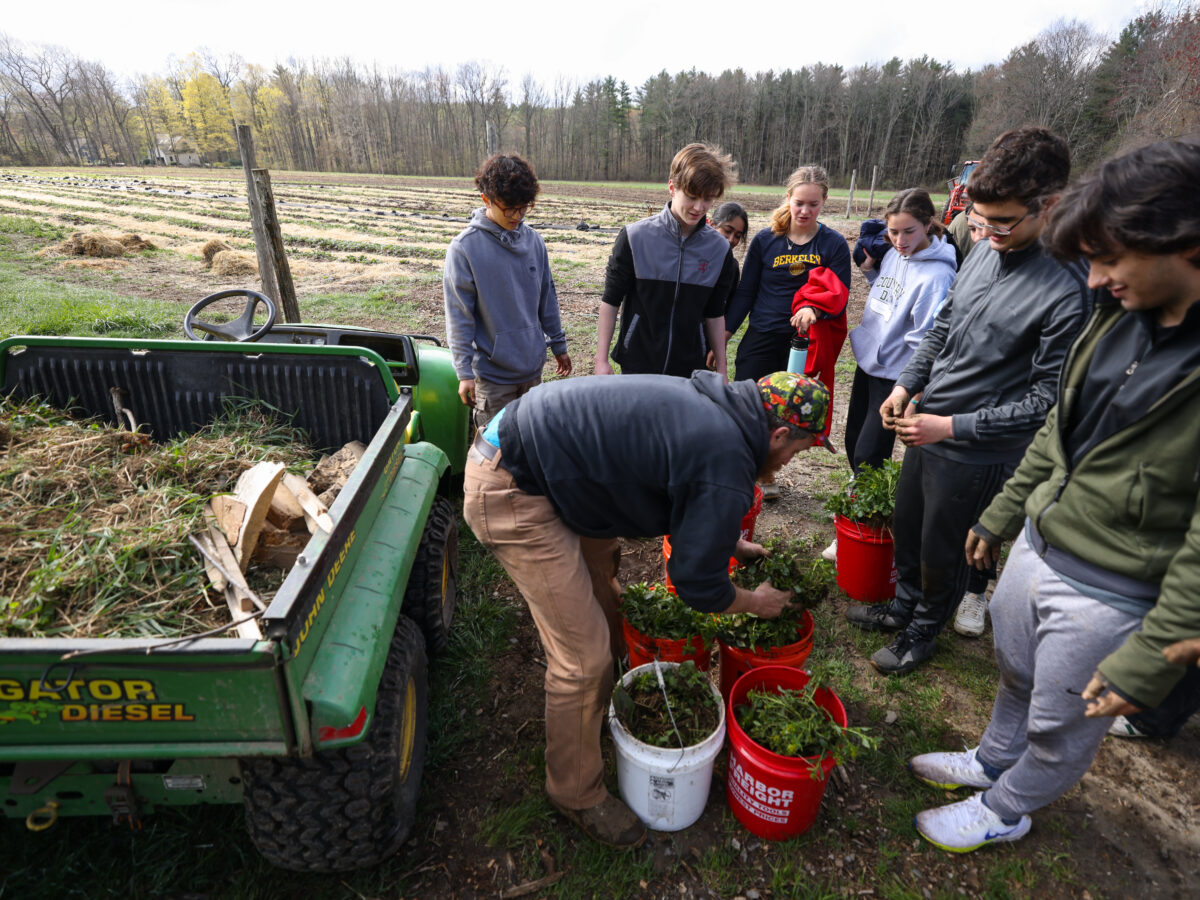Weeding and reading

Around 8:15 on a morning in late April, one of Exeter’s distinctive “Red Dragon” minibuses pulls up to Saltonstall Farm in Stratham, New Hampshire, owned and operated by Sophie Saltonstall ’07 and her husband, Kyle. Instructor in English Jason BreMiller hops out of the driver’s seat and 11 seniors, all members of BreMiller’s spring term English class Literature and the Land, file out of the passenger’s side door.
The students assemble in a Harkness-style circle in front of the large white barn. Kyle, clad in a black hoodie and a baseball cap printed with strawberries, asks them what they know about weeds. They’re quiet at first — it’s still early, after all — but the conversation soon picks up.
“[Weeds are] parasitic, in the sense that they steal resources from whatever’s already there,” offers Kate Nixon ’23.
Kyle nods. “Everybody thinks farmers grow plants, [but] we actually kill way more plants than we grow,” he says.
In addition to reading assignments, including Camille Dungy’s poetry and Braiding Sweetgrass by Robin Kimmerer, the students taking Literature and the Land spend much of their class time outside, observing and interacting with nature. Today’s Saltonstall Farm visit is one of a series of weekly class field trips; earlier in the term, they left campus at 4 a.m. for a sunrise hike in Pawtuckaway State Park in nearby Nottingham. Lit and the Land students have also explored Hampton Beach in the early morning hours, visited local apple orchards and beekeeping operations and paddled along the Exeter and Squamscott Rivers.
Now, the students file across the road to the strawberry fields, led by Hazel, the farm dog. Because strawberry plants send out long stems, with new plants growing from the ends, it makes mechanical weeding at this stage very difficult, Kyle explains. He kneels in the dirt to point out the main weeds plaguing the crop, including quackgrass (“my nemesis”) and the rosette-shaped yellow rocket.
Sophie hands out trowels and hand shovels as the couple’s nine-month-old son, Willie Nelson, peers out from a carrier on her chest. Kyle proposes a competition: Whoever pulls the most weeds will win a jar of farm-made strawberry jam.
Thus inspired, the students and BreMiller break into teams of two and get down to the work of weeding. As they work, some of the students stay close to Kyle, asking him questions — “How long does it take strawberries to grow?” “Do you guys use fertilizer?” — and chatting. Sheala Iacobucci ’23 mentions she’s taking a biology course in regenerative agriculture. “I think we’re coming here in a week or two on one of our field trips, so I’ll be back,” she says.
“I feel like I’m getting more dirt than plants,” Vibha Udayakumar ’23 says.
Kyle is reassuring. “Sometimes [the weed] doesn’t come out, and if it doesn’t come totally out, we’ll still get it in a death by a thousand cuts because we’re stealing a lot of its resources during its prime growing season,” he says. “So, there might be little bits that will come back, but it won’t be as bad.”

The sun has come out, lending warmth to the air. “You guys are doing great,” Sophie says. “Just another 100 hours or so and you’ll get to the end of the row and we’ll be done!”
A few ambitious students venture farther down the rows, separating themselves from the group. “Mr. Bre!” Jonathan Jeun ’23 cries. He holds up a large clump of weeds, their hair-like roots dangling, for his teacher to admire.
A few minutes later, the students begin wrapping up their work. They lug their buckets over for inspection, before heading back to the barn to wash up and board the Red Dragon back to campus. Kyle smiles as he assesses their haul. “I did not know a competition would work this well.”